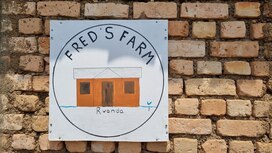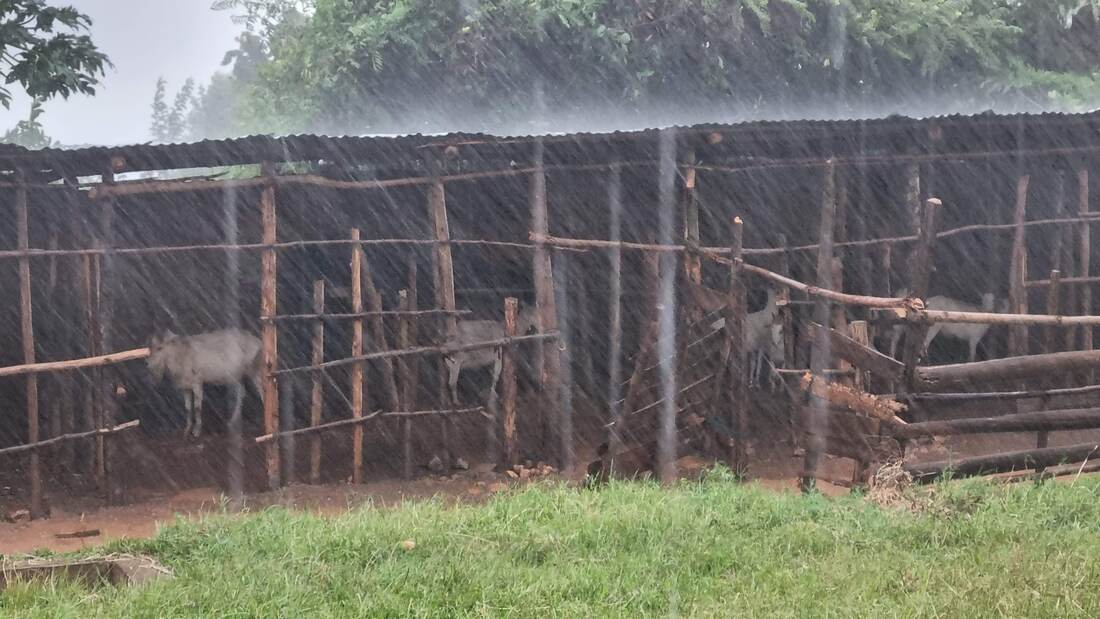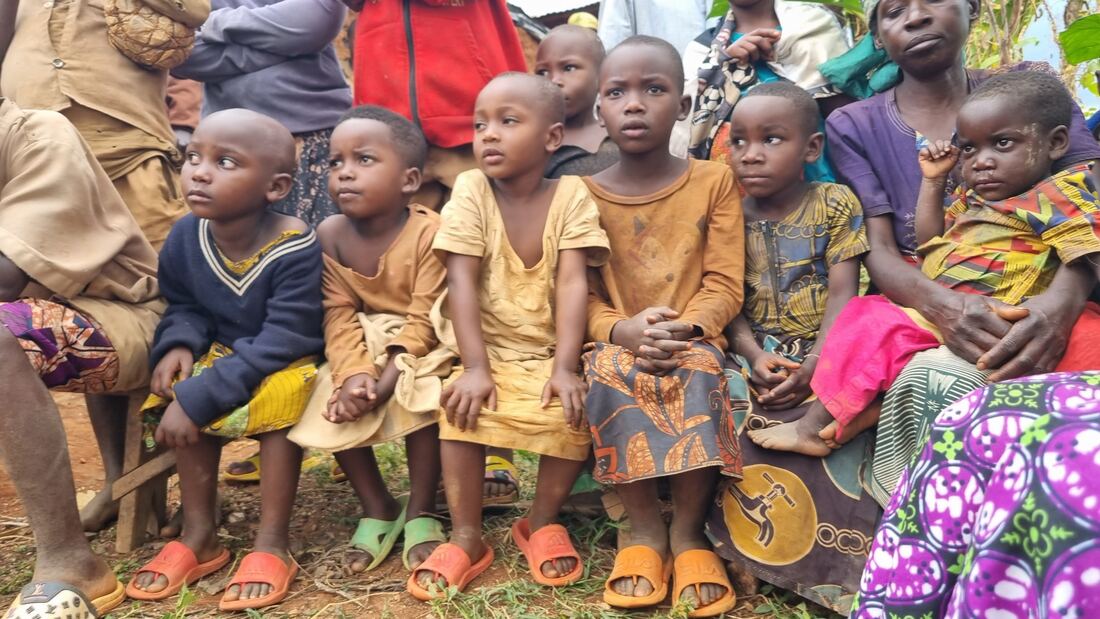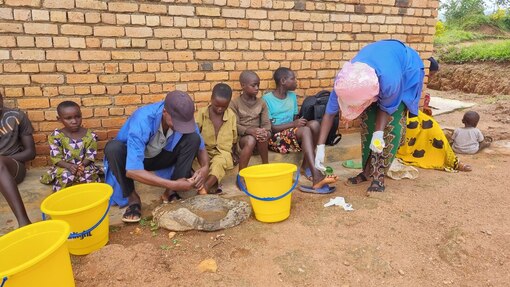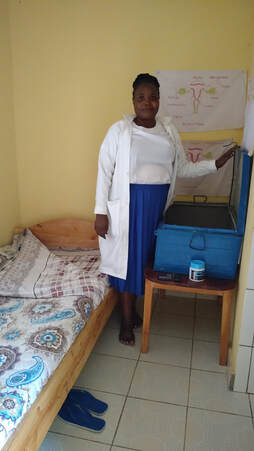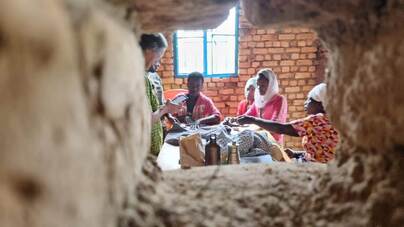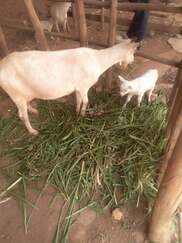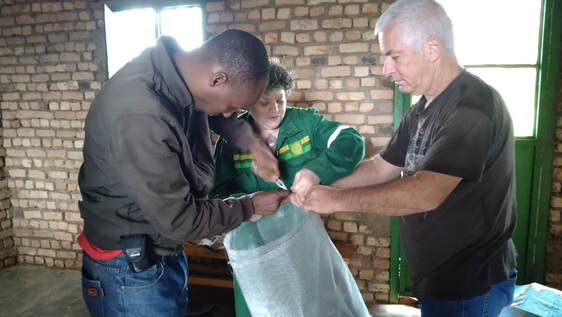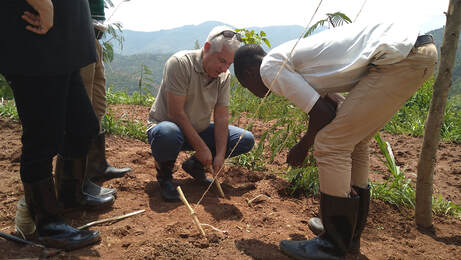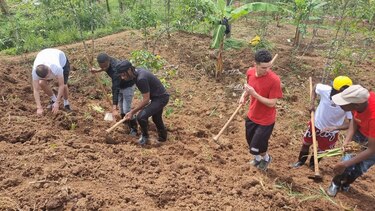|
This is the start of the rainy season. The dirt and stone road up to the farm was “passable” but we were witness to hail and relentless torrential rain which cuts deep, steep gorges in the hillside road where the road clings onto. Deep holes are carved out in cultivated fields, new “rivers” and “waterfalls” appear in anticipated and unexpected places on the farm. Life-giving rain, but oh so much damage! Overall, there are many positive trends especially regarding TWA and the internship program but as usual there are both set-backs and challenges. TWA 🫡 Kids in general are looking healthier, and more have better clothing. 🙂 More cultivation in their village. 🙂 More kids will be given the opportunity to attend school. 🙂 Microsaving functions well.
School 🫡 More kids to school, increased in the past year from 750 to 915 pupils at Kizi. 🙂 Solar lamp library working well. 🙂 Internship programme continues to function very well. 🙁 Macadamia tree we planted at school died. Farm 🫡 Dairy goats Interbreeding programme is functioning well. 🙂 New strategy to strengthen coffee cultivation, thanks to professional input. 🙂 Macadamia production increased and increasing as trees mature. 🙁 Since Fred’s death, 4 farmers claim ownership to land on FRED’S FARM. 🙁 2 bucks died; one on the farm and one at a farmer. 🙁 Coffee crop 2023 has not improved as hoped. TWA Our first visit to the TWA village is always coupled with a certain trepidation.. What will meet us this time round? What is the general atmosphere? Has the village become any greener? Do the kids look healthier/cleaner/better dressed? This time positive changes were to be seen and felt. Meeting us was not the usual overwhelming flow of people, shouting, waving, pushing and shoving - it was friendly, warm and non-demanding. There are visible signs of improvement, slow, slow changes over the past 8 years. Yes, the villagers still live in extreme poverty, but most of the kids don’t look as sick as before. More children were washed and had better clothing. Small areas were being cultivated, with fruit and vegetables, and we saw several small compost heaps similar to those Jacques had taught how to make last year. And chickens running around, financed by the microfinance initiative we started. Two houses had also planted some flowers! It was really warming to see all these positive changes.
Treatment of “jiggers” (tungiasis) Unfortunately, jiggers is still an issue. The main reason for this is that most families are still living in huts with earth floors. Everyone who needs treatment, is invited to come to the farm for treatment on a given date. Ten children met up, many had one or two parents and siblings on tow. But several came alone. Three of the eldest boys hid behind a tree close to where treatment was carried out, and Providence had to work hard to persuade them to come forward. Two local voluntary health care workers were invited to inspect and carry out treatment. These 2 dedicated people used hours to slowly but surely work their way along the line of patient, grateful children. Most of the children had jiggers on their feet, others also had on their hands. Each child received soap and sandals, as hygiene and protected feet are two important preventive measures. This time round the health care workers will follow up by visiting the families in their homes. KIZI SCHOOL (local school) Internship program for school children This time we could really see the positive effects of the internship program; the impact for the individual students and their families, and the potential for FRED’S FARM activities. Nine of the former interns attended a planting session for iron-enriched beans. They told us about the development of their small projects; Elias told us of how his piglet had now become a mature pig, piglets were sold and one of its first born was given to a needy neighbour. Each had their own story which they told with pride:) Finding the right human resources to help us work towards our goal of reaching out to the farmers in the area has not been easy. Now we see some of the interns can be this resource. One of our former interns, Pascasie, has just joined our permanent staff, and will be trained as a “moringa specialist”. In addition, we are planning to choose another former intern to follow up the interbreeding goat program in the community. This is the initiative to improve the milk production of local goats. We were witness to Pascasie starting her new job. She came “polished” in clean clothes, is well organised, exact in what and how she works, really motivated to learn and gets on well with others. This time round we were made aware of the situation for many young women like Pascasie; finished school and with no job opportunities outside the home farm. Many are pushed into prostitution. So from now on, we plan to prioritise girls when employing former interns. 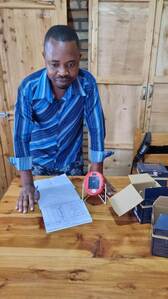 Sun powered lamp library at Kizi school FRED’S FARM established the “lamp library” just before COVID in 2020 and it is still working as intended. We had a meeting with the secretary at the school and went through his records. The library started with 47 lamps, 6 are now missing and 3 are broken. We changed batteries in 6. There had been a change in staff so we don’t know when the 6 lamps disappeared, but reckon it was a “COVID problem”. The school principal and staff are very happy with the initiative and acknowledge the need for lamps for the children. So we will continue supporting this and replace lamps which are lost and damaged. The secretary is aware he must keep good records to track each individual lamp. 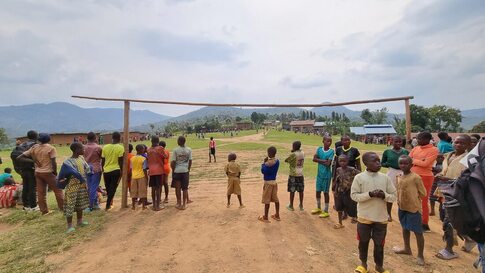 Footballs Kleins A/S Trondheim, Intersport Munkegate TRondheim and Strauss Group Israel, sponsored footballs and pumps for Kizi and Bwama schools. Thank you! Receiving new footballs is always a real highlight for the pupils, and the school leadership. The sports coach told us they are actively trying to promote and support girls' football. Currently Kizi school has 2 male and 2 female teams which compete in inter-school tournaments. He said these new balls mean they will be able to practice before matches with a real football!! Many play football barefoot - if anyone would like to support football boots next time we go to Rwanda, please let us know:) THE SISTERS CLUB The school has a small designated building at the school to provide space for girls who have their period. There's a bed with bedlinen for rest, a shower, a bidet and a toilet. There's no running water, but "the bucket system" is used. In addition there's a metal trunk with clean towels, clean underwear, clean reusable sanitary pads, and clean school uniform skirts. All of this is accessible for girls who need the facility. The metal chest was almost empty so we bought some towels and underwear. Here they learn about conception and contraception, about sexuality, about being master of their own bodies. The girls also learn how to sew their own sanitary pads. Hanne got a crash course in how to make these, and one very wet day on the farm, all girl workers who wanted could join a sewing session. None had used scissors before and most had never sewn, but all were eager:) All necessary materials and equipment is now available at the farm, so on rainy days or midday break, those who will can make these. THE FARM The dairy goats Apart from a few incidents recently with our bucks (male goats), the goats are doing very well. (Four goats have just given birth to four kids altogether, 3 male and 1 female. In addition 2 are pregnant. . ) Both bucks lent to farmers in the local community to provide an interbreeding service are “lost”; one farmer sold the buck, and the other buck died after eating poisonous leaves. Goats unfortunately goats don’t have an “in-house” red lamp to tell them when a foodstuff is poisonous, and cassava, a commonly grown food stables for humans, has poisonous leaves. The farmer who sold FRED’S FARM goat has been reprimanded by the village leader and “sentenced” to either give FF cash or a local goat. Apart from these set-backs, the interbreeding program with local goats in the neighbouthood is working well, 2 kids are born and 4 does are pregnant. All are healthy. The district vet and the village leader have set criteria for which farmers get the free "service" of the dairy goat buck; the female, must be healthy and big enough (at least 14kg), the farmer must have enough high quality forage available, the farmer must have a shelter for the goat, and he/she must be honest. The buck on the farm died while we were there. The vet examined it but could not find the cause. Thankfully there are many healthy pregnant goats on the farm, and just after our return home to Norway, 4 does gave birth producing 3 male and one female:) These 3 young males can in a few months be part of the interbreeding programme in the community, but we will have to buy a new buck for the farm. To find another way to better follow up the interbreeding programme in the community, we are looking into the possibility of employing one of our former interns.
Cultivation on FRED’S FARM Approximately 40% of all the land on FRED’S FARM is cultivated by local farmers and TWA. Those with little or no land for cultivation can ask for permission to grow. Each farmer gets access to land for one calendar year, 2 seasons. TWA have access to land all the times as they have no land themself for cultivation. 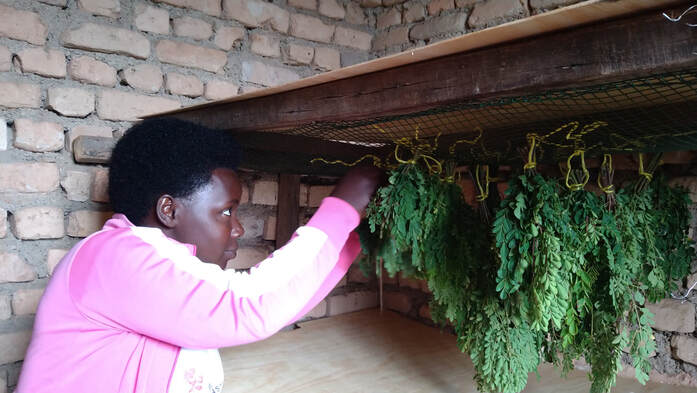 Moringa, “the miracle tree”, management After many years of trial and error, and much reading, we have at last cracked the code to consistently succeed in growing moringa! So armed with this knowledge and with Pascasie, our new employee, to closely follow up the moringa, we should be able to have a good demonstration area on the farm, and gradually be able to introduce at the school, the Twa village and to other interested farmers in the area. Support from Israel A relative from Israel (his father was from Trondheim) joined us for a week to support the project. Opher has a PhD, working in the field of sustainable agriculture in developing countries. He’s a practical academic, with much experience in several countries on the African continent, including Rwanda. Opher provided us with lots of practical input, including setting up a more robust trial with beans on Demo Plot. His presence and input was a real boost for us all, but especially Jacques. In addition his academic position paved the way to improve our cooperation with RAB ( Rwanda Agriculture Board ). Thanks to Opher we spent half a day at the national coffee research station where we learnt, and received plants and seeds! Opher is eager to continue to support FRED’S FARM! So he will be back. GREAT! In addition, Tami, a colleague of Opher, joined us for some days. Tami’s a social worker who works occasionally in Rwanda. She too provided us with valuable social input, and practical help:) A big thank you to both of them!! 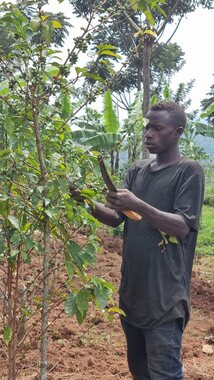 Coffee growing Over time we have questioned our method of growing coffee - it must be possible to grow coffee in a more efficient and more earth- friendly way. At RAB, we witnessed first hand what “cutting-edge” methods are being used in the Rwandan setting to produce coffee. They are experimenting with different forms of “conservation agriculture” systems, but all are following the principles of minimal soil disturbance (no till), permanent organic cover and species diversification. Jacques has bought into this idea, and we have already started implementing these new methods on the farm. This is very exciting! This year's coffee crop does not look as promising as last years. One reason is the weather; the dry season was 3 weeks longer than average. In addition there have been vicious rain and hail storms, damaging flowers, trees, soil and run off of nutrients. But despite the toll of harsh weather, many more trees are looking healthy and robust, so there is hope for the coming years. Also our new methods of tending coffee will in time help reduce the impact of the negative weather factors. Looking after the coffee Macadamia growing Yes, we are producing more nuts but we also have got some small friends in our storage area who have acquired a taste for these delicious nuts. The drying and storage method is now improved, and these little rascals can't cause harm! The macadamia trees are exceptionally healthy, are maturing and starting to produce more nuts. So this year there will be more nuts for sale: Team work with Jacques, Tami and Opher making new safe drying/storage for the macadamia nuts The demonstration plot The perimeter trees, fruit, shade and fodder, and grasses are becoming well established. The moringa planted last year didn’t survive. Our intention in the demo plot is to grow nutritionally rich food, in a way which best utilises the available space. Opher guided the interns to start a new trial with iron-enriched beans to see how best to plant them to get the highest yield. Opher explaining how to plant the beans Beehives and bees To promote better pollination, new beehives will soon be constructed by one of our present interns. Other visitors Tomas, Ole, Kenneth and Toni, four 19 year olds from Trondheim, visited the farm for a day. They joined the workforce to plant grasses on the coffee terraces, had a guided tour of the farm and then asked if they could play a football match at the local school:) The sports coach invited one of the girls teams to challenge them - a tough match for both teams!! The boys joined the workforce for some hours, Thanks! COFFEE for SALE Forty five kilos of green coffee filled our suitcases on return from Rwanda. The coffee will be roasted on Saturday 18.02. at Cafe Le Frere, Søndre gt. by the owner Kjell Harry Lyngaas. This is one of the ways Kjell Harry supports the project. Many thanks!! We'll send and email once the coffee is ready for sale. To each and every one who either supports FRED’S FARM every single month, or who gives a donation now and again. Thank you for making all of these changes possible:) Hanne and Sten
0 Comments
|
Details
Categories |
